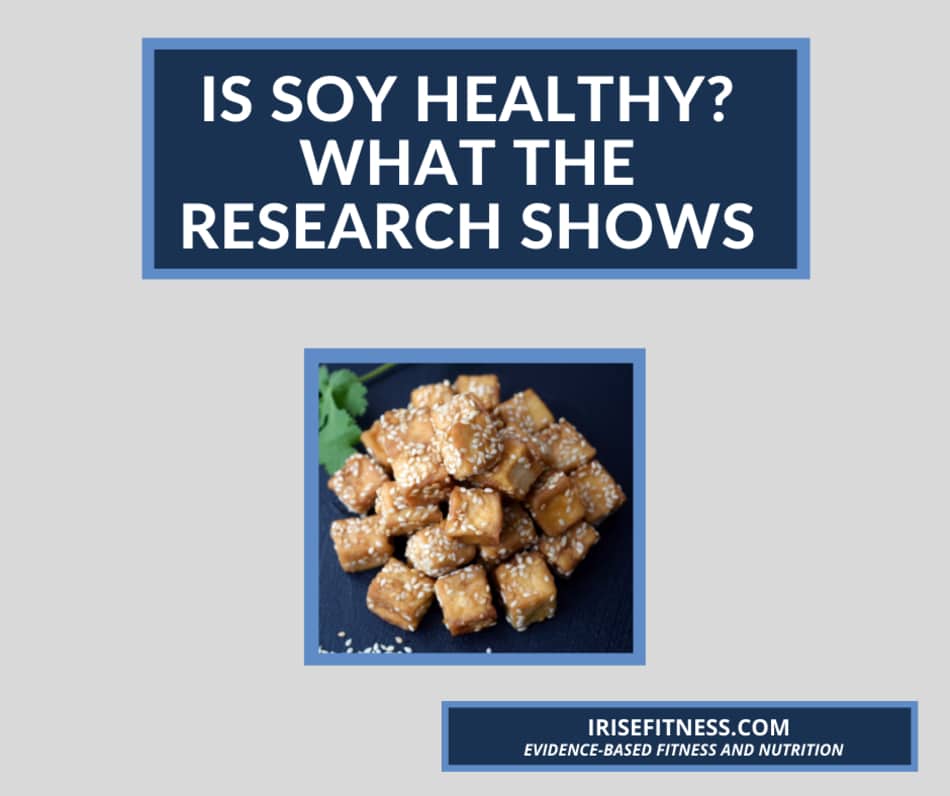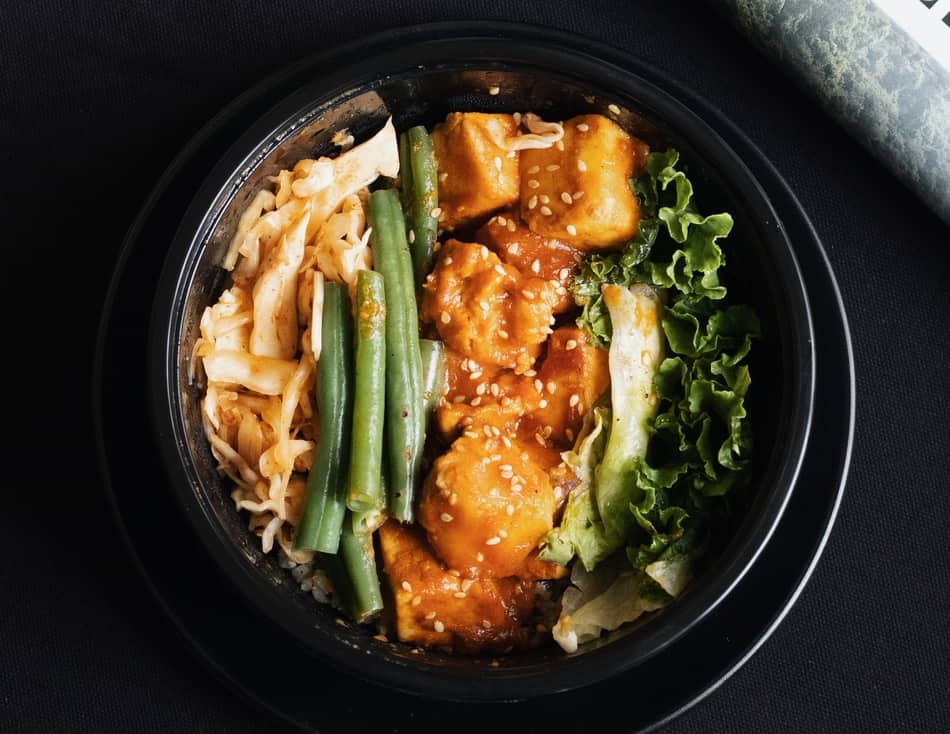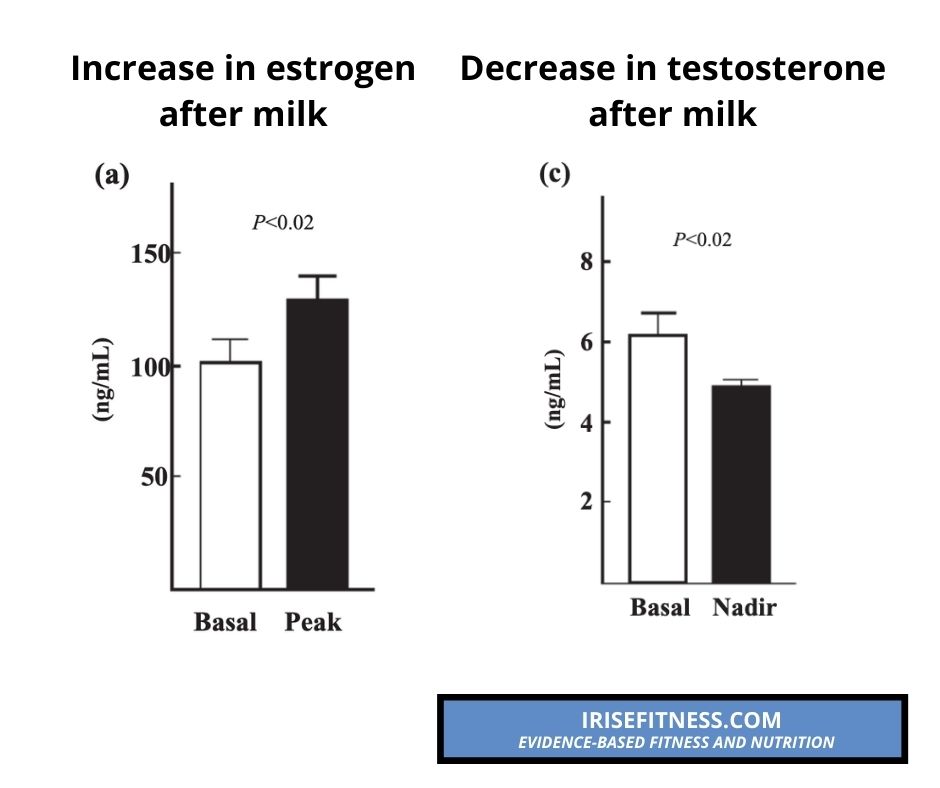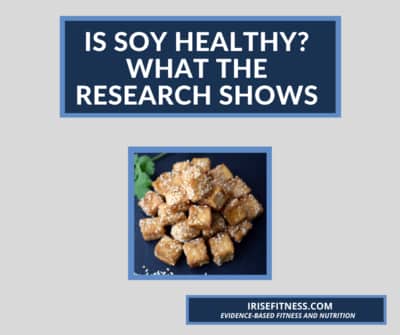
One of the most controversial topics when it comes to plant-based foods is soy.
On one hand, soy is very rich in nutrients and has been shown to limit your chances of developing certain chronic diseases.
On the other hand, some people are concerned about whether soy increases your chance of developing breast cancer and may lower testosterone levels in men.
With that said, the amount of misinformation out there about soy and its impact on health is surprising. Even in my daily conversations with clients, it’s by far and away the biggest concern people have when it comes to plant-based foods.
So in this article, I’m going to cover some of the research on soy and how it relates to human health.
What is Soy?
Before we get into it, let’s briefly talk about what soy is.
Soy comes from the soybean and technically is a legume (as all beans are). While soy often comes in slightly processed forms (see list below), it is still very high in nutrients, such as fiber, iron, magnesium, potassium, protein, and zinc.
Soy comes in different forms, but here is a list of the most common soy foods people eat:
- Tempeh
- Tofu (regular, firm, extra firm, super firm)
- Edamame
- Miso
- Soy milk
- Yogurt (made from soy)

Why Are Some People Concerned About Soy?
As I mentioned earlier, many people are concerned about soy. Let’s take a look at some of the reasons why so many people are skeptical about soy.
- Estrogen-mimicking effects: Many people are concerned that soy has estrogen-like effects on the body. As you will read in this article, research suggests that phytoestrogens, the type of estrogen in soybeans, function in the body differently than regular human estrogen.
- Cancer risk: Soy is often talked about in terms of its potential risk of increasing the chances you develop breast cancer. That link has not been established in the literature and as you’ll read about, there’s actually many studies showing the exact opposite (soy protecting against breast cancer).
- Feminizing effects in men: Some people claim that soy reduces testosterone in men because they think it increases estrogen levels. Human studies as a whole have yet to found this link (more on that later).
- GMOs: While it is true most soy in the United States is GMO, as you’ll learn in this article, 80% of that soy is fed to animals. So as long as you buy organic soy at the grocery store, it solves that issue.
Now that that’s been covered, let’s get into it.
Soy and Estrogen
One of the main reasons that there are so many conflicting opinions about soy has to do with the way it impacts the body. Soy is unique in that it contains a high concentration of phytoestrogen called isoflavones. Many people hear the word estrogen in phytoestrogen and think that soy will have estrogen-like effects on the body. In reality, isoflavones are a type of plant estrogen that, despite having a similar structure and function to estrogen in our bodies, has much weaker effects.
Estrogen is an important hormone in that it plays an essential role in normal sexual and reproductive development in women. While it has positive effects on reducing menopausal symptoms and improving bone health, estrogen can also have negative effects, such as increasing your chance of developing breast cancer.
Soy isoflavones are unique in that research shows they can actually bind to estrogen receptors and have either weak estrogenic or anti-estrogenic effects on the body, depending on the type of tissue. This is known as a Selective Estrogen Receptor Modulator, something that has proestrogenic effects in some tissues.
In fact, soy has proestrogenic effects on some tissues, such as the bone, and antiestrogenic effects in other tissues, such as the breast (which is the best of both worlds).
For example, while it promotes growth in bone tissues where we want it, it also has antiestrogenic effects in the breast. Research has shown that the more you drip phytoestrogens in a petri dish, the less estrogen is able to bind to its receptors.
This is why phytoestrogen consumption has been shown to reduce your chances of developing many diseases, but more on that in the next two sections.
If you want to watch a video on how soy has this effect on the body, check out this video.
Soy and Breast Cancer
When people think of soy, they most often immediately think of estrogen and breast cancer. If you look at research, however, you’ll find that soy intake is actually negatively correlated with breast cancer.
For example, this study looking at over 70,000 Chinese women reached the conclusion that “adult soy food consumption, measured either by soy protein or isoflavone intake, was inversely associated with the risk of premenopausal breast cancer.” For those of you who are statistics nerds, the association was highly statistically significant, with a P value of 0.001.

In this specific study, there was not a statistical difference between soy intake and postmenopausal breast cancer.
Specifically, those who had the highest soy intake throughout adolescents and early adulthood had a 59% lowered risk of premenopausal breast cancer compared to those with the lowest soy intake.
That statistic is impressive given the fact that breast cancer is the second most common type of cancer in women.
While breast cancer is a disease that almost entirely affects women, what about soy intake in relationship to men’s health?
Soy and Prostate Cancer
Western populations have a high incidence of prostate cancer. These populations do not consume soy frequently, but one group that does consume significant amounts of soy is Seventh Day Adventists.
This study asked over 12,000 men about their intake of soy milk and then followed these men for up to 16 years to see their rates of prostate cancer.
They found that frequent consumption (more than once a day) of soy milk was associated with 70 per cent reduction in the risk of prostate cancer.
Now you don’t need to be chugging soy milk each day, but the research is pretty clear. Moderate soy consumption reduces the risk of prostate cancer.
Soy and Other Diseases
There is a lot of research on how soy impacts other diseases, but I’m not going to go into great detail on that.
In general, research has shown that soy:
- Reduces your chances of dying from cancer in general by 12%
- Reduces your chances of developing heart disease
- Lowers blood pressure
- Decreases cholesterol levels
- Promotes bone health
- Improves fertility
- Reduces menopause symptoms
“Soy Kills Our Rainforests”
One argument people often use is that we are destroying our rain forests in order to grow soy. In reality, the soy you eat is not killing our rainforest. Over 80% of the worldwide soy is fed to livestock – the soy we eat is largely not being planted on deforested land.
On the contrary, animal agriculture is responsible for 90%+ of the Amazon rainforest destruction, so if your goal is to help the environment, limiting your consumption of animal products is the best thing you can do.
Soy and GMOs
When some people think of soy, they think of GMOs because the majority of soy produced worldwide is genetically modified.
So should we avoid soy?
No, because as I mentioned above, soy is associated with lower levels of chronic disease.
Furthermore, most GMO soy in the United States is used as feed for chickens, pigs, and cattle, whereas most of the major soy food manufacturers use non-GMO soy.
I try to eat organic because it limits exposure to the pesticides that are sprayed onto GMO crops.
I will make a more in depth article on the topic of GMOs and organic food in the future, so stay tuned for that.
Does Soy Make Men Less “Manly”?
Many men shy away from soy because they believe eating soy and drinking soy milk will lower their testosterone.
But what does the research say?
This meta-analysis investigated not only soy consumption, but also isoflavone consumption (the concentrated phytoestrogens found in soy products) on testosterone levels in men.
The study concluded that “neither soy protein nor isoflavone intake significantly alters any of these measures” (they tested other measures too that impact testosterone).
Research that showed soy had feminizing effects on men reported them eating 9 servings of soy per day. Eating 9 servings of soy per day is quite unrealistic, so that’s not really something to worry about.
Dairy Does Change Hormone Levels Though…
It’s funny because many people think that soy is going to increase estrogen levels, lower testosterone levels, give you man boobs, etc. But as I’ve presented in this article so far, that is not the case.
However, in reality, dairy, which most people do consume, does have these effects!
As seen in this study, dairy increases levels of estrogen in both men and women and actually decreases testosterone in men.

I think it’s also worth noting research that shows that vegans have higher total testosterone than both vegetarians and meat eaters.
So it’s pretty clear – soy is not the culprit. Instead, if you’re looking to keep your estrogen and testosterone levels in check and reduce your chances of developing chronic disease, increase your consumption of whole, plant-based foods (including soy) and avoid animal products like dairy.
How Much Soy Should You Eat Per Day?
The research is clear at this point that eating soy is healthy. But how much is too much?
There isn’t huge amount of research on how much soy we should be eating. That said, this study looking at Japanese individuals showed that 3 servings per day was perfectly healthy. There are other studies showing potential downsides after 5-10 servings a day.
So a good general guideline is to not exceed 3-5 servings of soy per day.
Conclusion
In conclusion, the benefits of soy, regardless of your gender, significantly outweigh the potential risks. In general, the majority of research (as presented in this article) concludes that soybeans are rich in nutrients and provide many health benefits, including lowering risk of many types of cancers, fewer menopause symptoms, and improved heart health.
The claims people make about the potential negative impacts of soy are not established well in the scientific literature.
Instead of worrying so much about a food group like soy, many people would be better off limiting their intake of dairy, which has very much been established in the literature to have a negative impact on human health.
So the bottom line is to limit your intake of animal products and increasing your intake of plant foods, including soy, as that will benefit your health.
Online Plant-Based Fitness and Nutrition Coaching
So if you are looking for a coach (who understands a plant-based diet) to help keep you accountable and create a plan specifically for you, I recently opened up a few spots for my online fitness and nutrition coaching. Here’s what it includes:
- Customized workout routine that is tailored to your goals based on your schedule/available equipment.
- Tailored plant-based nutrition coaching so you can reach your goals while optimizing your health.
- Integrated support system that allows you to be held accountable throughout your journey.
If you’re interested in working with me so you can reach your fitness and nutrition goals, feel free to reach out as I’d love to talk more about whether we might be a good fit for each other. Find out more here!

